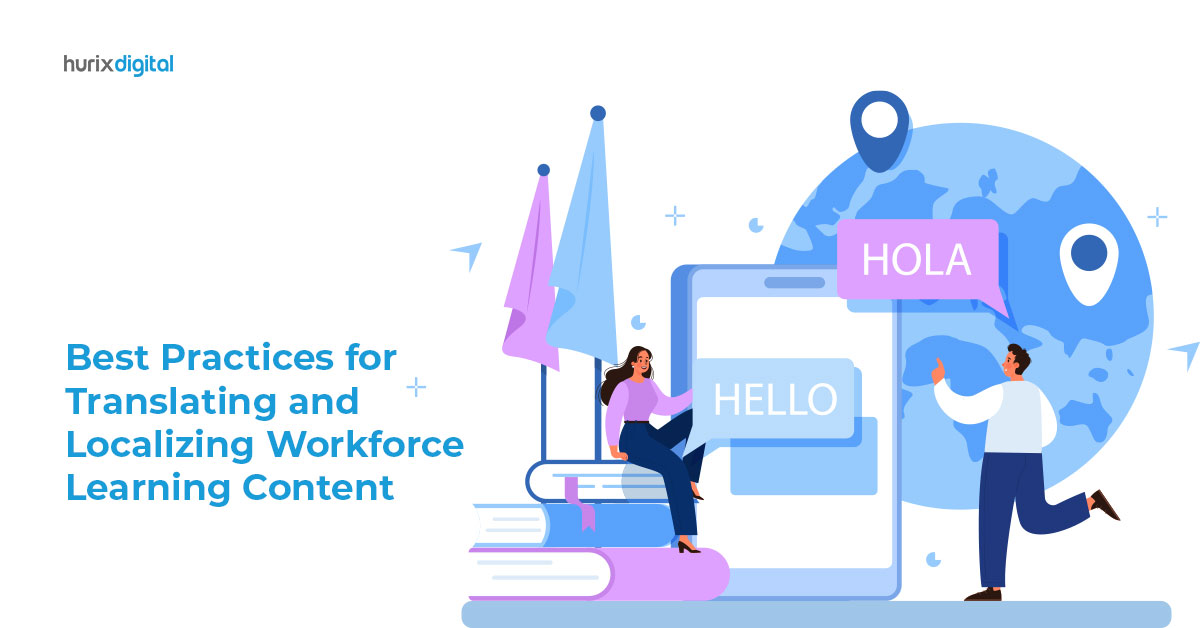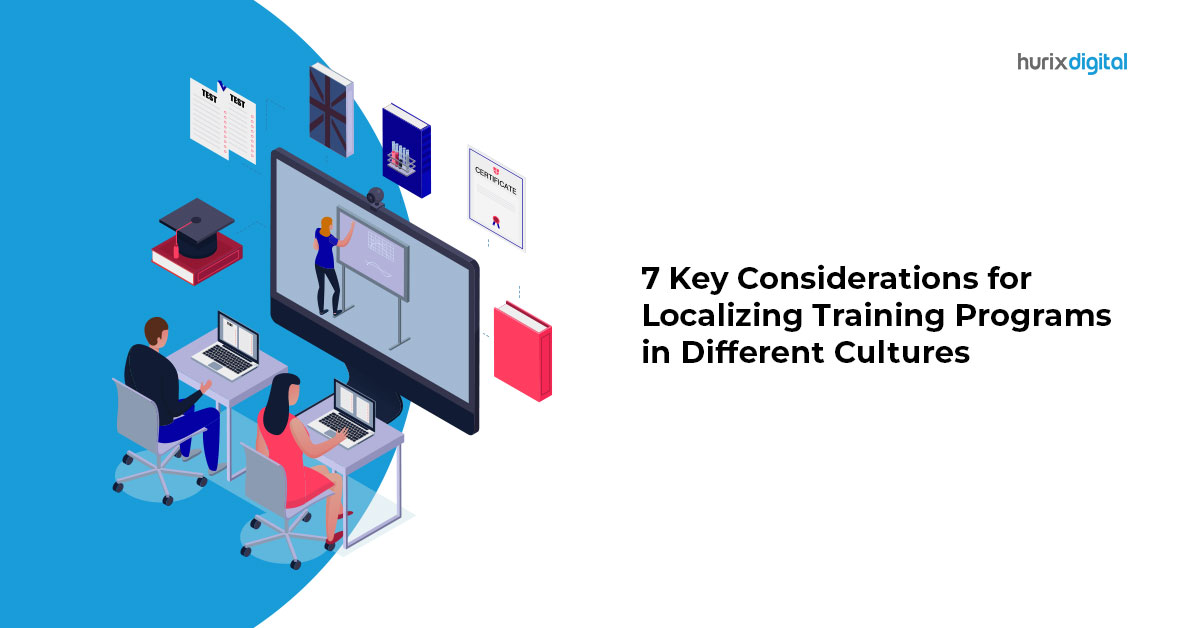
How Important is Localizing Your eLearning Content for Sales and Marketing Team
Summary
Explore the importance of localizing eLearning content for sales and marketing teams, including how it enhances training effectiveness and supports global business strategies.
Table of Contents:
- Localizing eLearning Content
- Why Is Localizing eLearning Content Important For Sales And Marketing?
- Conclusion
The pandemic was a turning point in the educational sector as a large number of educational institutions and ed-tech companies moved online. A report estimates that the total value of the Ed-tech industry will reach more than $319.65 billion by the year 2029.
The pandemic also led to a greater demand for workforce learning content and eLearning content localization as several employees sought to enhance their skills. A study reported that more than 58% of the global workforce had upskilled since the start of the pandemic, revealing the growing importance of corporate training localization.
Localizing eLearning Content
With remote working and learning becoming the new normal, it became important for educational businesses to translate and localize their learning content to adapt it to the diverse needs of learners in different locations.
With distance learning, institutions, and companies are supplying eLearning content to learners worldwide, contrasting traditional classrooms. Further, in the face of multicultural and global workforces, workplaces are looking to reach employees in multiple countries and localities.
Digital content localization plays an integral role in making educational content more accessible and effective for learners in different places. Localizing involves translation – which adapts the language and linguistic aspects of the course – as well as other ways of adapting eLearning content to suit a specific local context.
Localizing eLearning content generally helps an organization or business make its content more accessible, engaging, and effective. However, it is particularly important for a business’s sales and marketing team.
Also Read: 8 Challenges and Solutions in Localizing Training Programs for a Diverse Workforce
Why is Localizing eLearning Content Important for Sales and Marketing?
Localizing eLearning content enables you to adapt it to better align with local needs and cultural sensitivities. Here are some reasons why localizing eLearning content is important for sales and marketing.
1. Adapts to Cultural Norms
In addition to converting educational material from one language to another (translation), content localization companies ensure that the content aligns with different regions’ cultural and linguistic practices. Cultural factors influence how learners respond to educational content and intersect with how they engage with it.
The digital revolution has enabled companies to offer their products and services to multiple countries and customers of different nationalities and cultures. eLearning content localization helps education providers target learners in different regions in more effective, relevant, and appropriate ways.
This helps sales and marketing teams reach a broader base of learners. Since localized content reaches users better, it helps sales and marketing reach target audiences and bring in more revenue from a wider range of regions.
Your eLearning business can reach many different parts of the world by localizing its educational content and expanding your range of target markets.
2. Improves the Customer Experience
eLearning localization services adapt digital learning content to resonate with specific cultures. Learners find it more engaging and retain what they learn.
If eLearning content does not take into account the cultural context or local communication norms, students may find it difficult to connect to the material. The content may also come across as jarring if it contains material or expressions that are considered inappropriate in that culture.
Localizing the course improves the experience for learners by making it easier for them to relate to it and understand the material. This leads them to buy more courses or pay more attention to your e-learning product offerings, making things easier for your sales and marketing teams.
They are also likely to engage more with your digital content, which promotes marketing, and with your sales outreach.
3. Better Brand Value
Expanding your eLearning business beyond your traditional client base and winning over more target markets improves your company’s brand value through customer satisfaction, engagement, and feedback. Not only does it get a positive reputation as a versatile and inclusive educational provider, but it also becomes more widely known and prevalent.
Further, it gains a global presence as an international eLearning company, which adds to its brand value. A better brand image worldwide is important for your sales and marketing teams, which can tap into your wider audience to improve their marketing and sales efforts. It also makes it easier to market your brand and sell educational products.
Your brand also gains customer respect for representing their language and culture in your material, which improves customer loyalty.
Also Read: 8 Tried-and-Tested Tips For eLearning Content Localization
4. Saves on Production Costs for New Sales
When you develop a course for a certain target audience, you spend on its development. To develop a similar course again for a different target audience or client, you often have to incur additional development costs.
A good content localization strategy reduces the cost of developing a new e-learning course. You only spend on the cost of translation and content localization services. However, you get the revenue of an entirely new course. This allows you to save on development costs for course offerings to new audiences and increase your profit margins.
Further, it reduces the pressure of continuously developing new course offerings. When you are not in a position to develop new courses, you can focus on targeting different regions across the globe in different languages to increase the reach of your existing course material.
Localizing a particular course to new regions allows you to generate revenue without the cost and time involved in developing a completely new course. Further, it allows you to move a course into new markets without having to create the entire course afresh.
In this way, localizing is efficient, convenient, cost-effective, and time-saving. It saves you the effort of creating e-learning content from scratch and helps you optimally use resources by following content localization best practices.
5. It’s the New Trend in eLearning
With the rapid advancement of educational technology, digital access to education has become an important factor.
With online accessibility increasing, learners expect more accessible learning offerings and are looking for course offerings in their region. They are also more open to learning opportunities.
If eLearning companies can take advantage of this emerging trend in the eLearning sector, they can gain wider market support and boost their sales.
Conclusion
eLearning content localization plays an important role in making online courses more accessible and successful across different countries and localities.
As learning becomes increasingly transnational, localization is critical for eLearning businesses. It is particularly important for your sales and marketing team because of its contribution to aspects like market reach, customer experience, and brand value.
For the best localization services, head to Hurix Digital. It offers eLearning solutions for businesses and educational institutions. From devising a learning plan to executing an eLearning strategy, Hurix Digital offers custom solutions for a diverse range of client requirements.
Get in touch with Hurix Digital to know more!

A highly enthusiastic and motivated sales professional with over twenty five years of experience in solution selling of training-related applications and services. Maintains an assertive and dynamic style that generates results. Ability to establish long-term relationships with clients built on trust, quality of service and strategic vision. Specializes in financial services, higher ed, publishing and government in the areas of learning and development.








